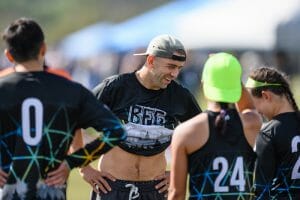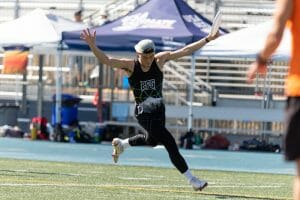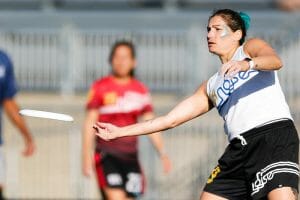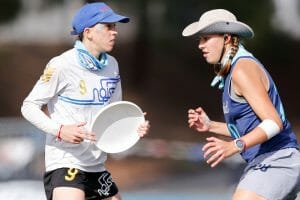Our selections for the seven best performers of the year.
November 23, 2021 by Ultiworld in Awards with 0 comments
Ultiworld’s 2021 Mixed Club Awards are presented by Five Ultimate; all opinions are those of the authors. Please support the brands that make Ultiworld possible and shop at Five Ultimate!
Ultiworld is pleased to announce our annual Mixed Club Awards. While we consider both regular season and postseason performance, because of the nature of the Club Division, we weight success in the Series and at Nationals above all else — this year even more so than most. The All-Club Awards are selected based on input from Ultiworld reporters, contributors, and editors.
Player of the Year Award
Offensive Player of the Year Award
Defensive Player of the Year Award
Breakout Player of the Year Award
Coach of the Year Award
All-Club First Team
All-Club Second Team
Club Awards Voting Breakdown
2021 Mixed All-Club First Team
Mario O’Brien (Seattle BFG)

There are few more experienced coaching minds in the game right now than Seattle BFG‘s Mario O’Brien. Even from early in his career, he has been a strategic thinker trying to dissect and advance the schematic elements of the game and invested in sharing his efforts with those around him. So it’s not surprising to see a team he helps lead put together one of the more structured and disciplined season-long performances we’ve seen in the division in a long time.
What’s perhaps more surprising is the outsized role O’Brien was able to carve out for himself in driving that strategy forward on the field. Almost two decades into an elite ultimate career, O’Brien looked as fit and dynamic as he ever has, accumulated wiliness not replacing the quickness that has long been his calling card but simply added to it. His complete repertoire of throws and deft decision-making powered the pacing and spacing of the BFG offense, finding and providing options that kept defenses on their heels, unable to bear down and apply much pressure. The Seattle captain found a way to maximize not only his impact but also the strengths of his teammates en route to a well-deserved national title.
–Steve Sullivan
Caleb Denecour (Minneapolis Drag’n Thrust)

With the roster shakeup for Minneapolis Drag’n Thrust this season, more responsibility was placed on Denecour, and he more than delivered. The decisions he had to make under pressure came at him rapid-fire, and somehow he was still the player Minneapolis most wanted with the disc in high-stress situations. He’s long past being the shiny new piece that Drag’n willingly integrated, and now instead is the glue guy on an offense that relied on his unfailing blue-collar offense — grinding out yardage-gaining cuts under pressure, making the right decisions with the disc without trying to do too much — to set themselves up for success.
It wasn’t just his offense that earned him his position on this list. Denecour was among his team’s best defenders, mainly due to the same ‘boots-on-the-ground’ mentality and style of play that made him such a premier offensive talent. No matter when or how a turn happened, Denecour immediately jumped to the front lines hunting for the block that would get the disc back. His tireless work ethic on the field — as evidenced perhaps most spectacularly in his performance against shame. in the prequarters at Nationals — epitomizes the ethos the Drag’n Thrust program has cultivated since before his arrival and that enables a player like him to be at his best this season.
–Graham Gerhart
Sarah Meckstroth (Minneapolis Drag’n Thrust)

An incredible two-way player, Sarah Meckstroth took many of the most difficult women-matching matchups for the Drag’n Thrust defense and served as a dynamic downfield threat for the Minneapolis handlers on offense. The 2018 POTY’s potency on both sides of the disc played a big role in the team’s ability to make come-from-behind runs, and her veteran leadership steadied the Minneapolis defensive line.
Between her height and ability to near effortlessly switch on cross-gender matchups, Meckstroth’s play stood out literally and figuratively on the field. Most frequently working downfield on both offense and defense, Meckstroth’s excellent field awareness helped her find gaps in the opposition defense and to opportunistically play off of her match-up to take away throwing lanes. It’s all part of an exceptional package, which Meckstroth used to her fullest capacity to wreak havoc on opposing teams.
–Jenna Weiner
Tommy Li (Seattle BFG)

If you’re trying to figure out the recipe for the secret sauce that helped Seattle BFG clinch a national title in 2021, it’s a sure bet that Tommy Li is one of the top ingredients. A mainstay of BFG’s O-line, Li shone throughout the season1 and his profile in the season’s narrative rose as his team slowly but surely ascended to the top of the division. He had the highest combined stat line on his title-winning team, with 13 goals, 18 assists, and 6 blocks recorded on the season. Li’s impact extended beyond what the stats demonstrate, however; he was one of the team’s leaders in touches and points played, as well as being the only player to shift from O-line to D-line in critical games. He ran circles around top-notch defenders, creating massive separation downfield, and displayed crazy hops with numerous sky catches and blocks alike.
Li’s role as a first-rate, good-old-fashioned system player is really what earns him a spot on the All-Club 1st Team but he had his share of game-changing and crowd-pleasing plays this season as well. A perfect example is his block in the end zone that prevented Ann Arbor Hybrid’s Nathan Champoux from reeling in his team’s second break of the game. Beyond getting the disc back in BFG’s hands, Li was pivotal in cooling Hybrid’s momentum and setting the stage for his team to get back on track and ultimately pull ahead. It’s difficult to imagine BFG clinching the top spot in the division without Li’s offensive and defensive contributions, and, since he’s one of the team’s founders, it’s only fitting that he played such an instrumental role in his team’s historic season.
–Isabel Cruz
Robyn Fennig (Madison NOISE)

After winning 2019 Women’s Club Player of the Year, Robyn Fennig finished just off the mixed POTY podium this year, landing on the All-Club 1st Team as one of only three players chosen for the first team on 7 out of 8 ballots alongside Mario O’Brien and Sarah Meckstroth.2 Fennig’s strong play at Nationals helped carry Madison NOISE to the mixed semifinals, tossing 14 assists — second amongst women-matching players behind Jesse Shofner –and catching 7 goals.
Fennig drew the toughest female matching defender from most opposing teams, and was still a tremendous asset offensively regardless of whether she was helping to catalyze the offense from downfield or distributing the disc and piling up touches in the handler space. Her experience and energy also seemed to help NOISE play to their fullest potential, easily beating their seed and expectations. Few throwers can match Fennig’s ability to deliver the disc to all parts of the field — her power, accuracy, and wide variety of throws meant that no defense was safe.
–Ben Murphy
Tannor Johnson (Boston Sprocket)

If you want to teach a young player what it looks like for a person on the field to have gravity — to pull attention from the opposition, to touch the disc in tremendous volume, and to be incredibly productive regardless of the situation — then the film of Tannor Johnson is the best place to start. His gaudy 10 goal, 19 assist, 3 block stat line from San Diego only starts to tell the story of how the game shifts when he’s on the field.
For Boston Sprocket’s offense, Johnson often started as an isolated cutter, forcing opposing defenses to choose whether they wanted to challenge him deep, or see what kind of throws he’d unleash after catching an under. Most often, he’d gobble up yards with an uncontested under — and he could do it repeatedly, marching the disc down the field with every long stride. When teams opted to challenge the under, Johnson consistently made them pay in the deep space, grabbing jump balls and skies in quantities that had analysts redefining what “50/50” really means. When he crossed over to defense, he helped anchor the Sprocket D-line and made every teammate more effective. Often picking up the toughest, tallest, fastest matchup, other defenders had an easier job, and Sprocket was able to pick up breaks.
Sprocket put together a solid showing in their maiden season and Johnson had plenty of help from many of his teammates, especially Bretton Tan and Caitlin Go. But this team seems destined to go as far as Johnson can carry them.
–Ben Murphy
Clea Poklemba (Madison NOISE)

From their late-game blocks to the upwind hammer assists, Clea Poklemba put on a show this season. As Madison NOISE won close game after close game to surprisingly finish at the top of their pool and make a run all the way to the national semifinal, Poklemba was the team’s closer, always available to come up with a timely block or a massive sky when the team needed a spark.
A well-rounded player, Poklemba would often cover the opposing team’s best downfield threat but operate in the offensive backfield after a turnover. Their versatility was also noted after the O-line got broken; often Poklemba would be called upon to cross-over and secure the ensuing hold. While some of her high-profile teammates (see above) were better known coming into the tournament, Poklemba was the talk of the fields all weekend because of their late-game heroics and all-around importance to NOISE’s unexpected success.
–Alex Rubin
We recognized Li on the all-tournament line at Pro Champs. ↩
No player was a unanimous 1st Team selection this year. ↩